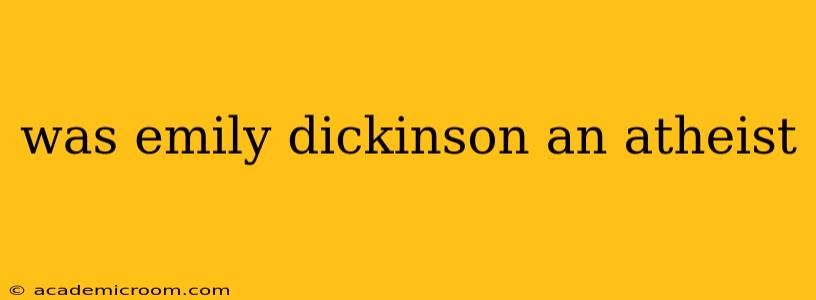Emily Dickinson's intensely private life and enigmatic poetry have fueled countless interpretations, including much debate surrounding her religious beliefs. Was she an atheist? The simple answer is: we don't know definitively. Her writings reveal a complex and evolving relationship with God, faith, and the afterlife, defying easy categorization. Instead of a simple "yes" or "no," a nuanced exploration of her spiritual journey offers a richer understanding.
Did Emily Dickinson Believe in God?
This question lies at the heart of the matter. While Dickinson used religious imagery and terminology extensively in her poems, the context often suggests a questioning, even skeptical, perspective. She grappled with traditional doctrines, expressing doubt and challenging established religious beliefs. Many poems depict a God both benevolent and distant, a creator both powerful and incomprehensible. This ambiguity reflects the complexities of faith and doubt present in her personal life. Instead of outright rejection, her work often portrays a struggle to reconcile her faith with her experiences and observations.
What Religious Beliefs Did Emily Dickinson Have?
Dickinson's upbringing within a devout Calvinist family undoubtedly shaped her understanding of religion. However, her poetry shows a departure from strict Calvinistic dogma. While she uses traditional religious language, she frequently subverts its conventional meaning. Images of heaven and hell, for example, often appear metaphorical, exploring broader themes of mortality, the unknown, and the human condition. Her unique perspective reframes traditional religious concepts, making it challenging to firmly place her within any specific religious framework.
What Did Emily Dickinson Say About Immortality?
The question of immortality is central to many of Dickinson's poems. Her explorations of death and the afterlife are not straightforward affirmations or denials but rather profound meditations on the unknown. She contemplates the possibility of a soul's continuation after death, but her perspective is never dogmatic. Instead, her poems reveal a deep fascination with the mysteries surrounding life and death, exploring the unknown with both fear and wonder. Her ambiguity leaves the reader to grapple with these questions, mirroring her own spiritual journey.
How Did Emily Dickinson's Family Influence Her Religious Beliefs?
Raised in a highly religious household, Dickinson’s exposure to Calvinist beliefs was profound. Her father was a prominent member of the Amherst community and her family was deeply involved in the church. This early exposure instilled in her a familiarity with religious language and imagery. However, as she matured, her own intellectual and spiritual explorations led her to question and reinterpret those beliefs. The tension between her upbringing and her individual spiritual quest is apparent throughout her work. It is important to note that while her family's religious beliefs were influential, they didn't dictate her ultimate spiritual stance.
Was Emily Dickinson a Sceptic?
It’s more accurate to describe Dickinson as a spiritual seeker than a simple sceptic or atheist. Her poems reveal a nuanced exploration of faith and doubt, questioning established doctrines while simultaneously expressing a deep longing for spiritual understanding. Her skepticism wasn't a rejection of all belief but rather a critical engagement with religious ideas. She challenged accepted truths, forcing both herself and her readers to confront the complexities of faith and the mysteries of existence.
Conclusion:
Labeling Emily Dickinson as an atheist simplifies a complex spiritual journey. Her poetry reflects a multifaceted engagement with religion, characterized by doubt, questioning, and a profound contemplation of life’s ultimate mysteries. Instead of a clear-cut answer, her work offers a rich tapestry of spiritual exploration, inviting readers to interpret her nuanced perspectives and engage with the enduring questions she posed. The enduring power of her poetry lies in its very ambiguity, a reflection of the human condition itself.
